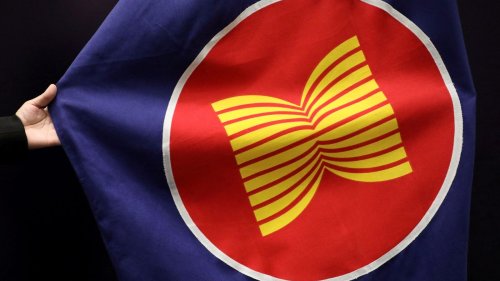By Voon Miaw Ping
KUALA LUMPUR, Dec 8 (NNN-Bernama) — The European Union (EU) wants to continue to work closely with ASEAN in further advancing economic prosperity, peace and security in the Indo-Pacific region.
EU Ambassador to ASEAN Igor Driesmans said the EU and ASEAN should anchor for stability, for multilateralism, for rule base international order and for free and fair trade.
“This is particularly important at the time of geopolitical tension and increasing rivalry.
“A strong ASEAN is in the interest of EU and a strong ASEAN is central to regional security architecture of the Indo-Pacific,” he said in a recorded video keynote address at the “EU-ASEAN At 45: From Dialogue Partnership to Strategic Partnership” international symposium, held here, Wednesday.
The two-day symposium organised by Centre for ASEAN Regionalism Universiti Malaya (CARUM) is held to mark 45 years of ASEAN-EU relations and as a prelude to the ASEAN-EU Summit which will be held in Brussels, on Dec 14.
Driesmans noted that ASEAN countries have continued to experience solid growth and the region is poised to become the fourth largest economy in the world by 2030.
“Going forward, we want to strengthen economic and connectivity link with ASEAN. There are a lot of potential and opportunities for trade between EU and ASEAN,” he said.
The EU remains an important trading partner of ASEAN. According to ASEAN statistics, the total value of two-way merchandise trade between ASEAN and the EU reached US$268.9 billion in 2021, grew by 18.6 per cent, year-on-year, from 2020.
The foreign direct investment (FDI) inflow from the EU to ASEAN increased by 42.9 per cent in 2021 on a year-on-year basis and amounted to US$26.5 billion.
The ambassador said the recently signed ASEAN-EU Comprehensive Air Transport Agreement (CATA) present an optimistic future for two sides as the agreement will open more opportunities for aviation sectors in both regions to increase connectivity, hence improving connectivity among the peoples and expansion of trade and business.
CATA is the first ‘bloc-to-bloc’ agreement between ASEAN Member States (AMS) and the EU which allows airlines from both regions to fly over the territory of ASEAN and EU.
Driesmans added that EU also looked forward to develop synergy between EU Strategy for Cooperation in the Indo Pacific and ASEAN Outlook on the Indo-Pacific.
A panelist at the symposium, Adjunct Professor of Economics and Development Studies at the Faculty of Economics and Administration, University of Malaya, Dr Kamal Salih said the Plan of Action to Implement the ASEAN-EU Strategic Partnership (2023-2027), which was signed last August was crucial in setting the momentum for the future of ASEAN-EU bilateral relations.
“If they (EU) can resolve the issue of palm oil, the issue of Islamophobia, immigration problem which are internal issues to them, I think our relationship can go very strong,” he said.
He also predicted that ASEAN relation with EU will grow stronger than with China and the US in the next five years.
The economist said that if the US-China rivalry continues, EU emergence as ASEAN strategic partner would be “buffer to the conflict” thus paving way for wider cooperation between the two regional blocs.
He said in the post-pandemic recovery, ASEAN-EU relationship bring new opportunities for stronger growth especially in the technology sector.
“The next phase of development post-COVID is actually technological, and EU can be the source of technology solutions to ASEAN,” he said.
In a separate session, former Malaysian Foreign Minister Syed Hamid Albar said going forward, ASEAN and EU must be pragmatic in harnessing the potential of their strategic partnership.
He said as strategic partners, both ASEAN and EU should expect more deep engagements and consultations on the current issues in both regions.
“The relationship must have substance, not just in form. The way forward is for us to look at things more openly and how both sides can work closer in this turbulence time, especially to deal with the economic crisis,” he said.
He said while both organisations are different in nature and ideology, there are things that ASEAN and EU can still learn from each other for mutual benefit such as in environment, peace and security, and community building efforts.
“I think the single biggest achievement of ASEAN is its ability to maintain peace and stability in the region,” Syed Hamid added.
EU became ASEAN dialogue partner in 1997. It acceded to the Treaty of Amity and Cooperation in Southeast Asia (TAC) in July 2012, becoming the first regional organisation to TAC.
In Dec 2020, ASEAN and EU elevated their relationship to strategic partnership.
ASEAN, the acronym for Association of Southeast Asian Nations, was established on 8 August 1967 with its members being Brunei, Cambodia, the Phillipines, Indonesia, Malaysia, Myanmar, Singapore, Thailand, Vietnam, Laos and the latest member being Timor Leste.
— NNN-BERNAMA





